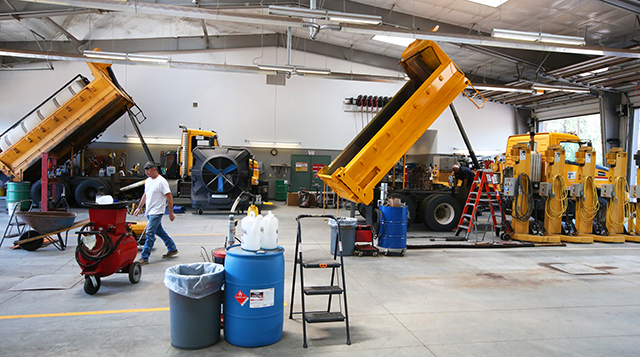Northwest Travel: Portland’s maker district
Published 12:00 am Sunday, October 4, 2015

- Barb Gonzalez / For The BulletinCoopers Hall opened 1½ years ago in Portland’s Central Eastside district as the first winery in Oregon to offer 100 percent keg wine. “So far, we’ve saved more than 54,000 bottles,” said partner Joel Gunderson, who noted the spacious tasting room was patterned after a brewery model.
PORTLAND — Scott Miyako came to Portland from Los Angeles because he wanted to start a company that was truly on the cutting edge.
A year ago, at ADX/Portland Made, he met a young man from Colorado with the same idea in mind and a similar background.
Trending
Today, company founder Miyako and lead bladesmith Hunter Lea operate the Portland Razor Company, along with Miyako’s partner from California, Alex Pletcher. From humble beginnings in the ADX metal shop, they now have their own storefront in Portland’s Central Eastside district and a burgeoning clientele that has left them with months of back orders to fill.
“I had been self-trained as a knife-maker,” Miyako explained. “It had been a hobby. I got into straight shaving and collecting old razors. Then I met Hunter, who was also a hobbyist knife-maker and who wanted to take it to the next level.”
At first, Miyako said, he and Lea were making each razor individually. “But our process keeps getting better,” he said. “Now, we are batch-making about 40 a month.”
Lea explained that the original profile for each blade is cut from stainless steel by water jet. Then the craftsmen grind the final product by hand, finishing it with a heat treatment to harden the steel. They sell and ship direct to clients, generally through their website.
“I was very surprised how much demand there was for quality straight razors,” Miyako admitted. “I think it’s because we’re bringing back an old tradition.”
Influence of ADX
Trending
The Portland Razor Company story is not unusual within the context of ADX, a collaborative art-design complex opposite St. Francis Park at Southeast 11th Avenue and Stark Street. ADX offers “makers” — people with a creative notion who need tools, space and perhaps additional knowledge — a 12,000-square-foot venue in which to pursue their goals.
“So many people have started here and moved on,” said Kat Solis, ADX’s membership director.
Established in 2011, ADX has about 200 active members, all of whom pay monthly dues or work equivalent hours on contracted projects to meet their responsibility, Solis said. Membership entitles craftspeople to full use of facilities, including wood and metal shops, a design-and-fabrication lab and a variety of classes.
“Over half of our members are training for their own businesses,” Solis said.
Public tours, offered three times a week, are a good initiation for potential members and general visitors.
The first tour stop is “The Bridge” design lab, whose features include laser and vinyl cutters, 3-D printers and an upholstery instruction area. Seven work spaces in the wood shop encourage the private production of everything from guitars and canoes to custom cabinetry. The metal shop features welding stations and a grindhouse. And in “The Cube,” activities range from graphic design and screen printing to industrial sewing, jewelry and metalsmithing.
“Everyone here has such varied backgrounds and levels of expertise,” Solis said. “So our education program extends from classes to one-on-one instruction.” Some of those classes, she said, are single-session events of three or four hours, held evenings or weekends for students from out of town. Other classes are series that extend across several weeks.
Central Eastside
Portland’s Central Eastside district — extending south from Burnside Street to Powell Boulevard and west from 12th Avenue to the Willamette River — is home to small businesses of all kinds. Most of them are based north of Hawthorne Boulevard, including a variety of beverage producers: craft breweries, urban wineries, spirits distillers and coffee roasteries.
South of Hawthorne, but still in the neighborhood, the Oregon Museum of Science and Industry gives expression to youthful inventiveness. Since 1992, it’s been located on 18.5 riverfront acres in a former Portland General Electric power generation plant. Children and parents alike may get in the creative spirit when they engage in hands-on experiments in physics, chemistry, design and much more. Certainly, many of Portland’s contemporary “makers” were stimulated by the mysteries of science during their formative years.
Few Central Eastside businesses are as well-known as Olympia Provisions, formerly Olympic Provisions. (“We’re changing a letter and nothing else,” the company pleaded, following its response to a cease-and-desist notice from the International Olympic Committee.) When it was established in 2009, the provisioner became Oregon’s first USDA-approved salumeria, which in another language means it is an Italian delicatessen that specializes in sausage and other cured meats.
As a youth, co-founder Elias Cairo watched his Greek-born father make traditional charcuterie. As a young man, he traveled to Europe to apprentice, then moved to Portland to re-create the techniques he learned. Now all of the company’s meats are hand-crafted and slow-cured in house, earning acclaim from food publications across the country. The daily café menu features numerous meaty sandwiches and an extensive choice of charcuterie and imported cheeses.
Among newer restaurants in the district, none is more acclaimed than Russian-inspired Kachka, a James Beard Foundation semifinalist earlier this year as one of the best new restaurants in the United States. Besides vodka and caviar, the menu encourages newcomers to Russian food to try such dishes as herring “under a fur coat,” crispy beef tongue and golubtsi (pork-stuffed cabbage).
Elsewhere, Trifecta and Loyal Legion stand side-by-side on Sixth Avenue just north of Morrison Street. The former features hearty tavern fare; the latter is famed for its beer selection (99 taps of Oregon beer) and a no-tipping policy. Nearer the river, Noraneko maintains the Japanese izakaya flair of its parent restaurant, Biwa, with drinks and noodles served into the wee hours. And Renata is a contemporary Italian restaurant with a seasonal menu, a communal dining room and a wood-fired oven.
Jacobsen Salt
Chefs at many of these dining establishments are no strangers to Jacobsen Salt, a neighbor at Southeast Sixth Avenue and Salmon Street. Indeed, the company that Ben Jacobsen founded in 2011 — the first in the Pacific Northwest to harvest salt since explorers Lewis and Clark built a temporary salt works in the winter of 1805-1806 — now distributes its product across the United States, to noted chefs as far from home as downtown New York.
Raised on the East Coast, but a graduate of the University of Washington, Jacobsen had lived for several years in Denmark and Norway before he returned to the United States in early 2009. “I thought it was strange that no one here was making great salt,” he said. “Instead, they were buying it from France.”
“Average” salt is easy to make, Jacobsen said. “But great salt is defined by its taste, its texture and its color. Great salt is clean and briny; it has a flaky texture, not grainy; and it is bright and brilliant.”
Over 2½ years, Jacobsen tested 25 spots along the Oregon and Washington coasts as possible locations for salt harvest. He finally settled upon Netarts Bay in Tillamook County.
“Netarts Bay is arguably the cleanest bay on the west coast of the United States,” Jacobsen said. “Because it has very little freshwater input (a single creek) and very little agricultural runoff, it has incredibly high salinity.” As well, it has a thriving oyster industry, with more than a million shellfish that filter 20 gallons of water apiece, per day.
Jacobsen developed a seven-day harvest process, whereby the seawater is filtered and boiled to remove calcium and magnesium, he said. Soft salt crystals form on top of the water and fall, like leaves or snowflakes, to the bottom of a steel evaporation pan. These fragile crystals are then drained, dried, hand-sorted and packed by a team of 35 employees.
Jacobsen’s team will show visitors samples of these crystals, some more than a half inch across, in visits to the company headquarters in Portland. They are displayed along with a variety of other products — flavored salts (garlic, pinot noir, rosemary, habanero and more), candies (caramels, licorice), tuna and mustard — at the entrance to the warehouse.
Last December, Jacobsen acquired Bee Local, which makes high-end Oregon honeys. “(Founder Damian Magista) and I have the same product outlook,” Jacobsen said. “Our focus is on high-level cooking, and we will sell nothing but the best. Yet we want our product to be affordable and approachable to the everyday home cook, and available to everyone.”
Williams-Sonoma carries Jacobsen Salt nationwide. In Bend, Jacobsen said, it’s available at Whole Foods, Newport Market and Ginger’s Cookware, among other stores. And Bee Local has placed a set of hives atop the Deschutes Brewery, whose chefs also use Jacobsen salt.
Cheese and chocolate
Cheese and chocolate are two favorites of craft food producers, and Portland is keeping pace here, as well.
The Ancient Heritage Dairy is a rural creamery gone urban, just around the corner from Jacobsen Salt. Established in Madras in 2011 by father-and-son cheesemakers Paul and Hank Obringer, it moved early this year into Portland’s historic 1920s Weatherly Creamery Building where large viewing windows encourage visitors to watch the cheese-making process.
With a nod to the traditions of France, Spain and Italy, the creamery produces small, hand-crafted batches of two pure, high-butterfat sheep’s-milk cheeses and five others that blend the milk of sheep and cows.
A new tenant to the Weatherly Building is Alma Handmade Chocolates, where Sarah Hart, a former English teacher, is making the sort of chocolates she couldn’t find for her son’s Easter basket.
“I wanted to make what didn’t exist,” she said. “I went to study with a master chocolatier and discovered I was inventing the wheel.” Today, Alma purchases its chocolate from Latin America — “We’re super-rigorous about sourcing,” Hart said — and crafts confections that include gold-trimmed religious icons such as the Virgin of Guadalupe and a meditating Buddha.
Beverage producers
With more than a dozen beverage producers in the Central Eastside, I took a closer look at just three on my recent visit.
Alan Sprints founded the Hair of the Dog Brewing Company in 1993, and he is still making his high-alcohol, bottle-conditioned beers more than two decades later. The craft brewery ages creative, original beers with names like “Fred” and “Adam” for up to eight years in oak barrels.
Coopers Hall became the first winery in Oregon to offer 100 percent keg wine when it opened 1½ years ago. “So far, we’ve saved more than 54,000 bottles,” said Joel Gunderson, one of the company’s six partners. “We’re installing keg wine systems in new and existing restaurants, as well as the taps in our own wine bar, which we’ve patterned after a brewery model rather than a typical tasting room.”
Stumptown Coffee was founded in 1999 by Duane Sorenson, who ignited coffee drinkers’ passions when he opened a small roastery and café at Southeast 45th and Division streets. Today, Stumptown has grown to become a nationwide phenomenon.
A pioneer in sourcing beans directly from farmers around the world, Sorenson opened a public tasting annex in 2005. Here, baristas still conduct daily “cuppings” at 3 p.m. Five different coffees — on my recent visit, from Ethiopia, Kenya, Sumatra, Guatemala and Costa Rica — showed distinctly different characteristics during the intriguing experiment.
There are no particularly notable hotels in the Central Eastside district itself. But just north, a short walk from the Oregon Convention Center, stand two independent and nontraditional properties. The Jupiter Hotel, on Burnside at Ninth, is attached to the Doug Fir Lounge, one of Portland’s favorite live-music venues. And the Hotel Eastlund, which opened earlier this year as a total renovation of a former Red Lion property, is a sleek and luxurious upgrade with a broad rooftop deck already famous for its happy hours.
— Reporter: janderson@bendbulletin.com








